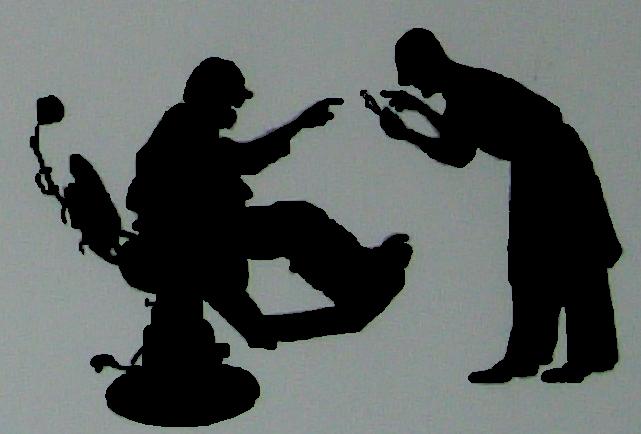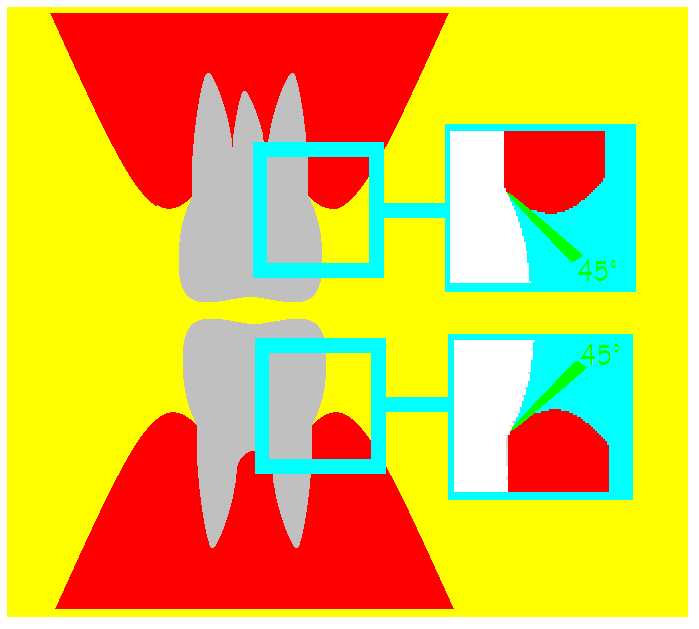Advice Sheets
Practice Advice sheets are provided on the following subjects:
After an Extraction, Your Temporary Filling, Your New Denture,
Your New Immediate Denture, Brushing Your Teeth and Take Home Bleaching:
Just scroll to the one that interests you!
AFTER AN EXTRACTION
Where your tooth has been extracted there is now a hole (the socket) that is roughly the size of the roots of your tooth. This hole fills up with blood, and the blood clots. Biting on the pad that the dentist put in your mouth helps the bleeding to stop, and you should keep biting on the pad for the first half-hour after leaving the surgery.If bleeding continues you should take a tissue or handkerchief and bite on it again. Pressure helps the bleeding to stop. The saliva in your mouth may be stained with blood; this is normal and is no cause for concern. If bleeding continues some hours after you have left the surgery, or if there is bleeding overnight, or if you feel concerned you should contact the surgery (telephone: 091 562709) for advice. (Out of hours you should leave a message with a telephone number at which you can be contacted on the answering machine)
You should be careful not to bite your cheek, lips or tongue while you are numb. Numbness usually lasts for two to three hours after leaving the surgery. When the numbness wears off it is usual to have some discomfort at the extraction and injection site.
If in pain take whatever you would normally take for a headache, as this is usually sufficient (for example, paracetamol or ibuprofen which can be purchased without a prescription in a pharmacy). If this is not helping you should contact the surgery. Stronger pain medication can be prescribed for you if necessary.
On the day of the extraction you can eat and drink as normal once the numbness has worn off. You should avoid rinsing out the socket with anything on the day of the extraction. On the day after the extraction you should rinse the socket with hot (but not burning) salty water. This should be done several times a day for a week. Rinsing with salty water helps keep the socket clean so that healing is not delayed, and keeps the socket clear of food, which can give you a bad taste in your mouth and cause your breath to smell. Be sure to keep your follow-up appointment if one has been made.
If you have any questions or problems please contact the surgery, or leave a message on our answering machine.
YOUR TEMPORARY FILLING
The temporary filling which was placed in your tooth today is composed of Zinc Oxide and Eugenol. Eugenol is distilled oil of cloves and allows a tooth to settle down before placing a permanent filling. A temporary filling is placed in a tooth where there is a deep cavity and the dentist is afraid that the placement of a large permanent filling might damage the tooth, or that the nerve in the tooth is of questionable health. If the tooth settles down after the temporary filling has been placed, a permanent restoration can be placed in the tooth with a greater chance of success at a later visit.
A tooth may be uncomfortable for a day or two after the placement of the temporary filling, but should improve after that. If it does so you should re-attend for a permanent filling in about two weeks time. If the tooth is not settling after a couple of days, or if the pain from the tooth is increasing then you should not wait, but contact the surgery at once. You may have an abscess and the tooth may require endodontic ("root-canal") treatment or extraction.
A temporary filling is not a substitute for a permanent filling and should not be left in your tooth for longer than the dentist has advised. Otherwise it will begin to break down and you may risk developing an abscess with pain and possible loss of the tooth. Be sure to keep your follow-up appointment.
If you have any questions or problems please contact the surgery or leave a message, with a contact telephone number, on our answering machine.
YOUR NEW DENTURE:
Your new denture is intended to improve your ability to eat and your appearance. When it is first fitted it will feel strange and cumbersome in your mouth. You may find that you lisp when you speak and that your mouth is producing more saliva that it usually does. This is normal and things should settle down over a few days as your mouth and your tongue become accustomed to the denture.
Most new dentures hurt here and there at first. Most of these areas of soreness disappear over the first week of wearing the denture. If, after a week, the denture is still hurting you should come back to the surgery where the denture can be eased to make it more comfortable. If you are coming back to have the denture eased you do not need an appointment. Easing the denture usually takes just a few minutes. You should wear the denture, although it is sore, on the day that you are coming to the surgery. This allows the denture to mark your gums and makes easing the denture more accurate.
Unless you have been otherwise advised you should always remove the denture at night when going to bed. This allows your gums to relax, and keeps them healthy. The denture should always be kept in plain water (a disinfectant may be added if you prefer) when out of your mouth. If the denture is allowed to dry out fully it may warp and this would impair the fit.
You should clean the denture every night when you remove it. Clean it with a soft cloth and lukewarm water. At first it is a good idea to do this over a sink full of water in case you drop the denture. Cleaning agents specially made for dentures can be used if you wish, but you should not use an ordinary toothbrush or toothpaste on your denture as it is too hard for the job. If you are brushing your own natural teeth you should remove the denture beforehand. Be sure to keep your follow-up appointment if one has been made.
If you have any questions or problems please contact the surgery or leave a message, with a contact telephone number, on our answering machine.
YOUR NEW “IMMEDIATE” DENTURE:
Your new denture is intended to improve your ability to eat and your appearance. It is called an “immediate” denture because it is fitted immediately after your tooth has been extracted. The advantage of this is that you have no gap after the extraction. The disadvantage of an “immediate” denture is that we cannot foretell how much your gum will shrink after the extraction. Gums always shrink where a tooth has been removed, and this takes about six months. After that time it may be necessary to adjust your denture, or, where there has been a lot of shrinkage of your gum, make a new denture.
When it is first fitted it will feel strange and cumbersome in your mouth. You may find that you lisp when you speak and that your mouth is producing more saliva that it usually does. This is normal and things should settle down over a few days as your mouth and your tongue become accustomed to the denture.
Where your tooth has been extracted there is now a hole (the socket) that is roughly the size of the roots of your tooth. This hole fills up with blood, and the blood clots. Biting on your new denture helps the bleeding to stop. The saliva in your mouth may be stained with blood; this is normal and is no cause for concern. If bleeding continues some hours after you have left the surgery, or if there is bleeding overnight, or if you feel concerned you should contact the surgery (telephone: 091 562709) for advice. (Out of hours you should leave a message with a telephone number at which you can be contacted on the answering machine).
You should be careful not to bite your cheek, lips or tongue while you are numb. Numbness usually lasts for two to three hours after leaving the surgery. When the numbness wears off it is usual to have some discomfort at the extraction and injection sites. If in pain take whatever you would normally take for a headache, as this is usually sufficient (for example, paracetamol or ibuprofen which can be purchased without a prescription in a pharmacy). If this is not helping you should contact the surgery. Stronger pain medication can be prescribed for you if necessary.
On the day of the extraction you can eat and drink as normal once the numbness has worn off. You should not remove the denture for the first 24 hours after fitting. If you do so your gum may swell and you may not be able to replace the denture for some days! You should remove the denture after 24 hours and wash it with lukewarm water and a soft cloth. There will be clotted blood inside the denture where you had the extraction. At this time you should begin to rinse the area where your tooth was removed using hot salty water, and you should continue to do this a few times a day for the first week of wearing the new denture. After the first 24 hours you should always remove the denture at night when going to bed. This allows your gums to relax, and keeps them healthy.
The denture should always be kept in plain water (a disinfectant may be added if you prefer) when out of your mouth. If the denture is allowed to dry out fully it may warp and this would impair the fit. You should clean the denture every night when you remove it. Clean it with a soft cloth and lukewarm water. At first it is a good idea to do this over a sinkful of water in case you drop the denture. Cleaning agents specially made for dentures can be used if you wish, but you should not use an ordinary toothbrush or toothpaste on your denture as it is too hard for the job. If you are brushing your own natural teeth you should remove the denture beforehand.
Most new dentures hurt here and there at first. Most of these areas of soreness disappear over the first week of wearing the denture. If, after a week, the denture is still hurting you should come back to the surgery where the denture can be eased to make it more comfortable. If you are coming back to have the denture eased you do not need an appointment. Easing the denture usually takes just a few minutes. You should wear the denture, although it is sore, on the day that you are coming to the surgery. This allows the denture to mark your gums and makes easing the denture more accurate. Be sure to keep your follow-up appointment if one has been made.
If you have any questions or problems please contact the surgery or leave a message, with a contact telephone number, on our answering machine.
BRUSHING YOUR TEETH:
Your toothbrush should have a small head (about 2 cm long) so that it will fit well around your mouth, and be of Medium hardness. Hold the head of the toothbrush horizontally against your teeth with the bristles part way on the gums. Tilt the brush head to about a 45-degree angle, so the bristles are pointing under the gum line. Move the toothbrush in very short horizontal strokes so the tips of the bristles stay in one place, but the head of the brush waggles back and forth. This allows the bristles to slide gently under the gum. Do this for about 20 strokes. With the correct brush this will cover about 2 teeth at a time. This assures that as much plaque as possible is removed from the "moate" around the teeth - the most important area to keep clean for gum health.
Brushing too vigorously or with large strokes or with a hard toothbrush can damage gum tissue or wear into your teeth. Repeat in pulses around the mouth, so that all tooth surfaces and gum lines, upper and lower, outside and inside, are cleaned. For the insides of your front teeth, where the horizontal brush position is awkward, you can hold the brush vertically instead. This is not as effective but is better than nothing! To clean the biting or chewing surfaces of the teeth, hold the brush so the bristles are straight down on the flat surface of the teeth. Gently move the brush back and forth or in tiny circles to clean the entire surface. Do the side walls of the teeth in the same way. Move to a new tooth or area until all teeth are cleaned. Rinse with water to clear the mouth of food residue and removed plaque.
You can clear even more bacteria out of your mouth by brushing your tongue. With your toothbrush, brush firmly but gently from back to front. Do not go so far back in your mouth that you gag. Rinse again.
Do not use a coarse toothpaste or tooth powder. Do not brush your teeth within one hour of taking anything acidic such as carbonated drinks or fruit juices, as this may cause erosion of the tooth surface. Change your toothbrush regularly.
Using dental floss and interdental brushes (like small bottle-washers) is good for cleaning areas where the toothbrush may not reach. There is a very wide range of mouthwashes and rinses available which can help to decrease the bacteria in th mouth, but despite the manufacturers suggestions, these are no substitute for physical brushing. Some (sugar-free) chewing gums may help to decrease acidity in the mouth.
The single most effective way to prevent decay and gum disease is to brush your teeth efficiently!
TAKE HOME BLEACH TREATMENT GUIDELINES:
The use of the bleach and bleach trays will be demonstrated to you when attend the surgery to collect them.
INSTRUCTIONS:
- Brush your teeth.
- Be sure tray is dry before adding bleach. Remove the syringe cap and insert an application tip by twisting it securely onto the syringe. Place a small drop of gel into every compartment of the tray for the teeth undergoing treatment.
- Seat the tray, with the gel around the teeth. After you put the tray in – firmly push the tray back against the teeth and seal to the gum.
- Wipe away excess gel in mouth with a tissue, dry soft brush or a Q-tip and next time use less gel.
- In the morning (or at lease 3 hours later) remove the trays and rinse the mouth with lukewarm water.
- Brush your teeth.
- Clean the trays with brush or Q-tips under cool water (always be sure tray is dry before adding bleach).
Do not eat, drink or smoke while wearing the tray. Do not smoke immediately after treatment - wait for at least two hours. Foods and drinks containing strong colours should be avoided for at least 48 hours or consumed in moderation. Use gel at room temperature.
If you develop sensitivity while using bleach you should take will a day or two in the treatment. If you have any concerns whatsoever you should discontinue treatment and contact the surgery.
STORAGE & HANDLING:
Store in cool place (2°-25°C / 35°-77°F).
Do not use after expiration date.
PRECAUTIONS:
Keep out of reach of children and pets.
Not to be used by pregnant or lactating women or children under 14 years old.
Discontinue use if any unusual sensitivity or reactions occur and contact the surgery.
Do not inject bleach into the body.
FIRST AID:
Warning: Causes skin & eye irritation
Eye (contact): Wash thoroughly with water and seek medical advice if symptoms persist.
Skin (contact): Wash thoroughly with water and seek medical advice if symptoms persist.
Ingestion (large amount): Drink plenty of milk or water and seek medical advice.






